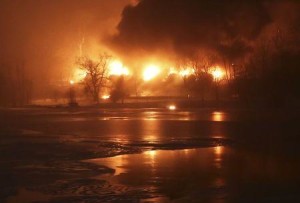Okay. When reading I find that much of the discussion surrounding the environment surrounds around the social component of the environment, however, I personally feel that it is extremely important to consider the fiscal ramifications behind legislation and discussion of the environment. So in my postings, I will attempt to balance both the social and fiscal aspects of the environmental debate.
Not a Good Day to be in West Virginia
Monday, February 16, the state police were forced to evacuate residents of Mount Carbon, West Virginia, a small town near Charleston, due a train accident. At 1:30 pm, several oil cars derailed and caught on fire. The CSX train was hauling 109 cars from North Dakota to the coastal town of Yorktown, Virginia, where midstream firm Plains All American Pipelines runs an oil depot. According to West Virginia State Police First Sergeant Greg Duckworth, 9 or 10 of the cars had exploded in intervals of about every half hour.
The accident has led to a house catching on fire and oil leaking into the Kanawha River and one or more tanker cars fell into the river leading to concerns about potential contamination of water treatment facilities that serve two downstream communities according to Lawrence Messina, a spokesman for the West Virginia Department of Military Affairs and Public Safety. One person was being treated for potential inhalation.
Not only was this problematic for the train company and the person whose house was burnt down, the water contamination provides a serious dilemma problem. There are concerns that the oil spill could have affected the Montgomery Water System which services about 2,000 people in the area. Unsurprisingly water is running of the shelves as customers have been told to conserve water as the government attempts to determine the depth of the threat.

e Photo Courtesy of Yahoo News
This latest accident came just two days after a Canadian National Railways train from Alberta’s oil sands derailed in a wooded area of northern Ontario. 29 of 100 cars were involved and seven cars caught fire and 29 of 100 cars were involved in the accident overall. No injuries were reported, but the cars were still on fire on Monday as of 7:30 pm.
UPDATE: as of 1:00 p.m. on Wednesday, a full two days after the initial explosion in which 25 cars went off the rails, the train was still on fire. Luckily, no oil was detected in water of the river carried out by local water provider West Virginia American Water, and the Company restored water service to all customers in the area.
Not a Good Day to be a CSX Shareholder
CSX Corporation is a transportation supplier company which provides rail-based transportation services including traditional rail service and the transport of intermodal containers and trailers. In response to the accident, CSX established a community outreach center to address community needs as a result of the train derailment and attempted to reserve rooms are hotels for displaced residents.
On Wednesday, CSX Corp. traded down 1.28% which represents shareholders concern in regards to the costs associated with the clean up and likely law-suit that the Company will face in regards to this accident.
Going Forward
An increased amount of rail accidents will likely spun United States and Canadian regulators to increase safety regulations of such shipments due to the concerns over the flammability of light oil from the North Dakota Bakken shale and the outdated nature of some tanker cars. In fact, the U.S. Transportation Department has submitted a proposal to the White House to mandate an additional 1/8th inch of steel to most current oil train tank shells. Under this proposal, new models would have to have a thicker hull installed according to an article on yahoo news by Kara Van Pelt. Such regulations would seek to prevent these type of spills in the future and even more so, prevent types of accidents that the Quebec town of Lac-Mégantic witness in 2013 in which 47 people were kill after a train carrying crude oil derailed and exploded.
Clearly, oil tankers burst and exploding poses a substantial risk to the environment overall, especially in regards to water pollution which has the potential to damage or wipe out entire ecosystems as was seen in BP oil spill in the gulf of Mexico. Going forward we can only hope that the governments in North America will be able to find a safer way to transport the oil that our countries need.